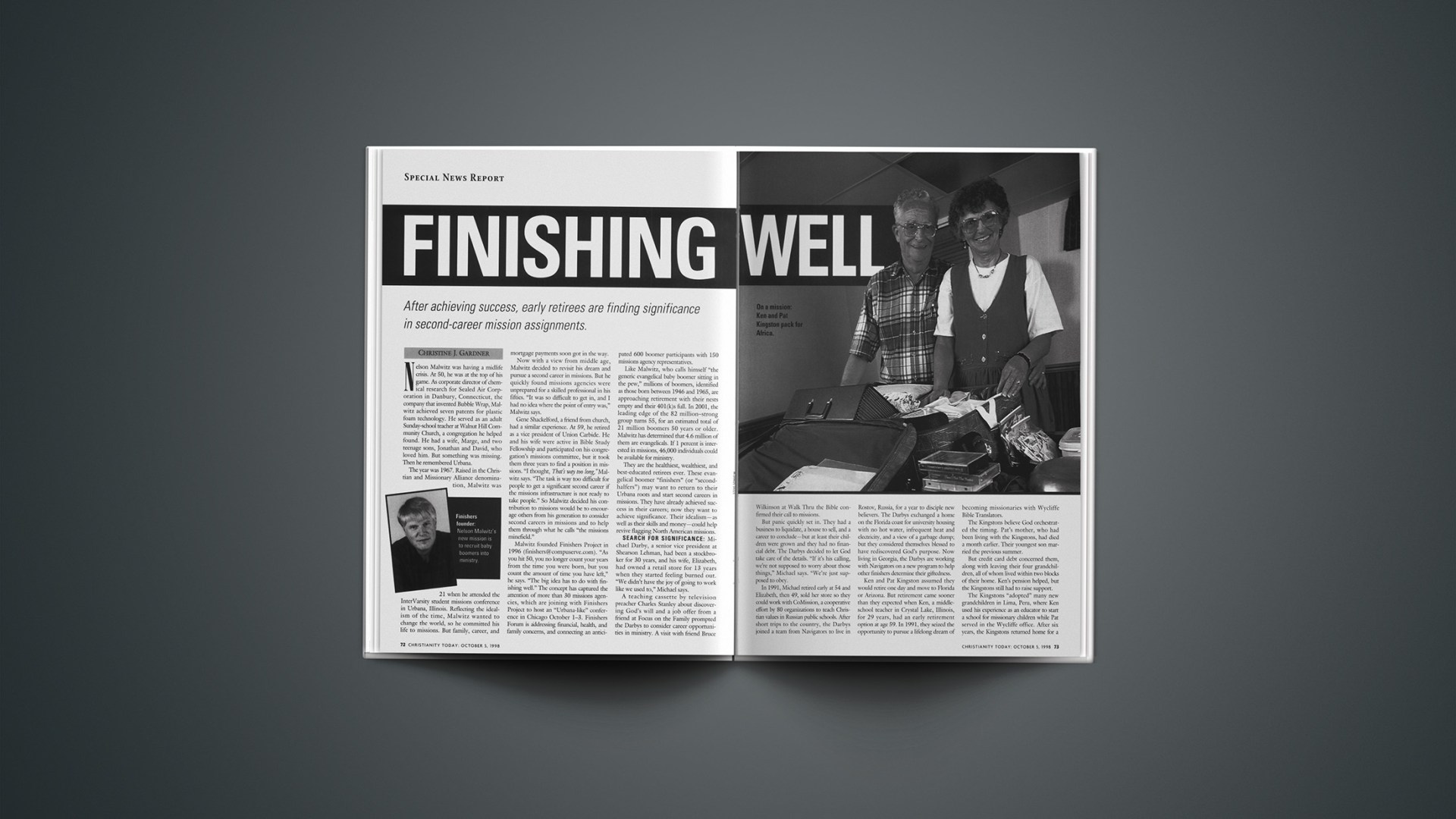Nelson Malwitz was having a midlife crisis. At 50, he was at the top of his game. As corporate director of chemical research for Sealed Air Corporation in Danbury, Connecticut, the company that invented Bubble Wrap, Malwitz achieved seven patents for plastic foam technology. He served as an adult Sunday-school teacher at Walnut Hill Community Church, a congregation he helped found. He had a wife, Marge, and two teenage sons, Jonathan and David, who loved him. But something was missing. Then he remembered Urbana.
The year was 1967. Raised in the Christian and Missionary Alliance denomination, Malwitz was 21 when he attended the InterVarsity student missions conference in Urbana, Illinois. Reflecting the idealism of the time, Malwitz wanted to change the world, so he committed his life to missions. But family, career, and mortgage payments soon got in the way.
Now with a view from middle age, Malwitz decided to revisit his dream and pursue a second career in missions. But he quickly found missions agencies were unprepared for a skilled professional in his fifties. “It was so difficult to get in, and I had no idea where the point of entry was,” Malwitz says.
Gene Shackelford, a friend from church, had a similar experience. At 59, he retired as a vice president of Union Carbide. He and his wife were active in Bible Study Fellowship and participated on his congregation’s missions committee, but it took them three years to find a position in missions. “I thought, That’s way too long,” Malwitz says. “The task is way too difficult for people to get a significant second career if the missions infrastructure is not ready to take people.” So Malwitz decided his contribution to missions would be to encourage others from his generation to consider second careers in missions and to help them through what he calls “the missions minefield.”
Malwitz founded Finishers Project in 1996 (finishers@compuserve.com). “As you hit 50, you no longer count your years from the time you were born, but you count the amount of time you have left,” he says. “The big idea has to do with finishing well.” The concept has captured the attention of more than 30 missions agencies, which are joining with Finishers Project to host an “Urbana-like” conference in Chicago October 1-3. Finishers Forum is addressing financial, health, and family concerns, and connecting an anticipated 600 boomer participants with 150 missions agency representatives.
Like Malwitz, who calls himself “the generic evangelical baby boomer sitting in the pew,” millions of boomers, identified as those born between 1946 and 1965, are approaching retirement with their nests empty and their 401(k)s full. In 2001, the leading edge of the 82 million-strong group turns 55, for an estimated total of 21 million boomers 50 years or older. Malwitz has determined that 4.6 million of them are evangelicals. If 1 percent is interested in missions, 46,000 individuals could be available for ministry.
They are the healthiest, wealthiest, and best-educated retirees ever. These evangelical boomer “finishers” (or “second-halfers”) may want to return to their Urbana roots and start second careers in missions. They have already achieved success in their careers; now they want to achieve significance. Their idealism—as well as their skills and money—could help revive flagging North American missions.
SEARCH FOR SIGNIFICANCE: Michael Darby, a senior vice president at Shearson Lehman, had been a stockbroker for 30 years, and his wife, Elizabeth, had owned a retail store for 13 years when they started feeling burned out. “We didn’t have the joy of going to work like we used to,” Michael says.
A teaching cassette by television preacher Charles Stanley about discovering God’s will and a job offer from a friend at Focus on the Family prompted the Darbys to consider career opportunities in ministry. A visit with friend Bruce Wilkinson at Walk Thru the Bible confirmed their call to missions.
But panic quickly set in. They had a business to liquidate, a house to sell, and a career to conclude—but at least their children were grown and they had no financial debt. The Darbys decided to let God take care of the details. “If it’s his calling, we’re not supposed to worry about those things,” Michael says. “We’re just supposed to obey.
In 1991, Michael retired early at 54 and Elizabeth, then 49, sold her store so they could work with CoMission, a cooperative effort by 80 organizations to teach Christian values in Russian public schools. After short trips to the country, the Darbys joined a team from Navigators to live in Rostov, Russia, for a year to disciple new believers. The Darbys exchanged a home on the Florida coast for university housing with no hot water, infrequent heat and electricity, and a view of a garbage dump; but they considered themselves blessed to have rediscovered God’s purpose. Now living in Georgia, the Darbys are working with Navigators on a new program to help other finishers determine their giftedness.
Ken and Pat Kingston assumed they would retire one day and move to Florida or Arizona. But retirement came sooner than they expected when Ken, a middle-school teacher in Crystal Lake, Illinois, for 29 years, had an early retirement option at age 59. In 1991, they seized the opportunity to pursue a lifelong dream of becoming missionaries with Wycliffe Bible Translators.
The Kingstons believe God orchestrated the timing. Pat’s mother, who had been living with the Kingstons, had died a month earlier. Their youngest son married the previous summer.
But credit card debt concerned them, along with leaving their four grandchildren, all of whom lived within two blocks of their home. Ken’s pension helped, but the Kingstons still had to raise support.
The Kingstons “adopted” many new grandchildren in Lima, Peru, where Ken used his experience as an educator to start a school for missionary children while Pat served in the Wycliffe office. After six years, the Kingstons returned home for a year, but they now are packing for a three-year assignment in Kenya. “[Retired] people are traipsing around the country in rvs,” laughs Pat. “I think that would be the most boring life I could ever imagine.”
Both the Darbys and Kingstons achieved success in their careers, but they wanted something more. Bob Buford would say they sought significance. Buford, whose book Halftime (Zondervan, 1994) is the unofficial guidebook for finishers, says that for retirees who choose service over leisure, “the payoff is blessedness.”
A recent survey of 600 evangelical boomers, sponsored by Finishers Project, indicates 61 percent would like to retire early and pursue a second career. Fifty-four percent say they would consider a second career in missions. Eighty-one percent want to be able to serve with their spouse. “They want to leave a legacy,” says Rod Beidler, director of international recruitment for Navigators.
MISSIONS DILEMMA: As early retirees search for significance in the second half of their lives, some missions leaders are wondering whether self-absorbed boomers are willing to make the costly sacrifices necessary to serve in overseas ministry. But with the leveling off of church commitment to foreign missions, agency leaders may have few alternatives to draw in a significant number of fresh missions candidates.
The Mission Handbook (MARC, 1997) indicates that by 2000, more than 1 billion people still will not have heard the gospel message. Yet as the world’s population increases, North American mission efforts have not.
“Basically, we’ve plateaued,” says Jim Reapsome, founder of Evangelical Missions Quarterly, commenting on the current numbers of full-time North American missionaries. By contrast, the number of short-term missionaries—on assignments as short as two weeks—continues to rise.
There are more available missions positions than qualified candidates to fill them. TEAM is recruiting for 700 positions. Wycliffe has 1,500 openings. Servant Opportunity Network, a computer matching service for retirees, lists more than 6,000 available jobs with more than 200 missions agencies.
Ralph Winter, general director of Frontier Mission Fellowship, estimates non-Western missionaries will outnumber Western missionaries in the next few years. Missions experts point to the new ranks of cross-cultural missionaries from developing-world congregations as the result of centuries of missionary commitment from the Western church.
But in North America, the church’s financial support of missions is steadily declining. According to Money Matters: Personal Giving in American Churches (Westminster John Knox Press, 1996), 10-15 percent of Protestant church budgets goes to foreign missions, roughly half the amount of what it was in the 1950s. The State of Church Giving Through 1992 (empty tomb, inc., 1994) estimates that Protestant church members each gave only $20 to foreign missions in 1991, compared to $164 spent on soft drinks and $103 for sporting goods.
“[The church] is losing its zeal,” says Larry Walker, southwest regional director for ACMC, which assists its 1,000 member churches with their missions programs. “The older generation understood missions more.” He says pluralism and materialism have changed the missions climate.
Christina Accornero, a board member of InterServe and Finishers Project, believes the church needs a missions revival. “We’re going through a crisis in missions,” she says. “Especially Americans, we’re pretty comfortable with our things. There are many missionaries coming home on furlough who don’t want to go back.” Finishers Project could be the catalyst for revival. “I think it’s a test—a God-directed test—to see if we are open to a new movement of the Spirit,” Accornero says.
OVERCOMING OBSTACLES: Missions agency leaders agree that they need to update their processes to accommodate boomers. Malwitz, as a test to see how agencies would respond to a finisher, forwarded the name of Indiana financial consultant David Ober to two dozen missions agencies. Sixteen of the agencies made no effort to contact Ober. Eight sent standard information packets—data geared to recent college graduates, not older professionals with concerns about health insurance and financial planning.
Navigators’ Rod Beidler says that when he started receiving calls from finishers looking for second careers, “we didn’t know what to do with them. We were caught very much by surprise.”
Ed Lewis, a recruiter with International Teams, says finishers know the primary need to spread the gospel worldwide. “They are up to the challenge and want to get involved,” he says. “We don’t want to put unnecessary obstacles in their path. And I think maybe, right now, we’re doing that.”
Mike and Linda Green, of Jupiter, Florida, shared a desire to use their skills in communications technology to further world evangelism. In 1994, Mike retired early at 58 from a 30-year career as a nuclear engineer and started his own business as a software consultant. Linda, then 49, worked as an editor of an online financial publication. Their passion for missions had been fueled by Urbana, which Mike first attended in 1957 and they both attended in 1996. But the missions agencies they approached would not accept them because they both had earlier been divorced—twice for Linda and once for Mike, while he was a Christian.
Mike and Linda applied at six agencies, all of which turned them down. Most agencies terminated their applications early in the process. “Some just come right out and say, ‘Sorry, we can’t have divorced people as part of our organization,’ ” says Mike. One agency said they “had to limit their damages, so to speak,” he says. The Greens’ worst experience involved a missions agency that accepted them after numerous interviews, but later retracted their offer after a staff member threatened to leave if the organization hired a divorced couple. “It was painful at times,” Mike says.
CULTURE CLASH: Both boomers and missions agencies are anticipating a clash of cultures. The attributes of boomers that make them so appealing—spiritual and emotional maturity, professional skills, and financial security—may also create problems that could hinder missions objectives.
The largest cross-cultural adjustment a boomer may have to make is between the corporate and nonprofit worlds, especially if the boomer has left a leadership position. “If a finisher is a high-powered, CEO-type, he’s not going to be prepared to sweep the halls,” says Winter.
Some finishers may expect a leadership position in missions, Lewis says, but it will take time for them to gain credibility with career missionaries who may feel threatened by finishers who seem to use missions as a hobby. He believes more finishers such as Michael Darby—who had no qualms about leaving a management position in finance to work as part of a discipleship team in Russia—are looking for a respite from the responsibilities of leadership.
Others, such as the Kingstons and the Greens, may want to use their professional skills in missions, but it may mean they will have to serve in a support role. If they are not wealthy enough to support themselves on retirement income alone, they may have a difficult time raising support. “We view missionaries as people going into hardship posts, maybe wrestling with cockroaches,” says Art McCleary, a finisher who left a career in human resources to work for Senior Ambassadors for Christ. “But when they are in an office setting in the West, it is difficult to see them as missionaries.”
Mike and Linda Green finally found computer positions with the Caleb Project in Littleton, Colorado, but they recently had to withdraw their acceptance because they could not raise enough support. After 15 months of raising funds, the Greens had only 15 percent of their $70,000 combined first-year support. By contrast, Mike’s oldest daughter and her husband, who are leaving to plant a church with a Mennonite missions team in Albania, have raised their full support. Mike and Linda Green sold their house in August in anticipation of their move to Colorado. “We’re back at square one in many ways,” says Mike.
Another potential area of frustration is recruitment and training. Finishers say the hiring process is too slow, taking several months to several years before a candidate is accepted, trained, and has raised support.
In most cases, finishers are mature in their faith but have not had the formal Bible training required by most agencies. TEAM, for example, requires 30 semester hours of Bible classes for its full-time missionaries. Finishers Project is looking to develop a “Bible sat” to accommodate those who are biblically literate but may not have the college transcripts to prove it.
The lack of a foreign language could also hinder a finisher’s effectiveness in missions by limiting options to support roles in the United States or reliance on an interpreter.
But altering the training requirements to meet the needs of boomers is an area of serious concern for Winter, who sees a growing “amateurization” in missions. “I don’t care if you have a Ph.D. in marketing, [a finisher] still needs to know what missions is,” he says. Otherwise, they will just be “sand in the machinery.”
DRIVE-BY-MISSIONS? Despite the eagerness of missions agencies to retool their processes to attract finishers, some missions experts are skeptical. They fear finishers could change the focus of missions by demanding short-term options, disregarding indigenous leadership, and posing a threat to career missionaries.
Winter believes finishers will not want to spend their last years of life overseas, instead choosing “drive-by missions projects.”
“For the most part, short-termers have given up trying to make a contribution to missions,” Winter says. “It’s kind of an expensive education, and almost a futile way of conducting missions.”
But short-term missions opportunities could help finishers verify their commitment to longer-term assignments, says Paul McKaughan, president of the Evangelical Foreign Missions Association.
Missions experts herald the growth of indigenous leadership in missions and express concern over whether a new corps of Western finishers may be counterproductive to internationalization. “The role we played in the past is not the role we will play in the future,” says McKaughan. “We will not be calling the shots from the West.”
Ruth Tucker, visiting professor of mission at Trinity Evangelical Divinity School, says, “Our fix-it-upper mentality—that we can do it—it’s passe.” Finishers Project is “wrong-headed,” she says, if nationals are not consulted first.
Bill O’Brien, director of the Global Center at Samford University, says finishers need to know the church in the Two-Thirds World is prospering, with an estimated 1,000 sending agencies and more than 40,000 missionaries. North American Christians still have a pivotal role to play in missions—especially in the training of national leaders—but O’Brien says finishers need to understand they are the students in this process.
The agencies’ eagerness to court finishers could be perceived as a slap in the face to career missionaries who bypassed opportunities for profitable careers. “Oftentimes, missionaries are a little bit offended by the fact that these people come in and ‘haven’t paid their dues,’ ” acknowledges Malwitz. “However, they’re just going to have to get over it.”
HISTORIC OPPORTUNITY: Despite the concerns, Finishers Project is taking advantage of a historic opportunity. Plans are under way for an adult educational video, a toll-free number with information on job availabilities, and a finishers magazine. The idea is spreading around the globe: Malwitz has received calls from boomers in Canada, Germany, Ireland, New Zealand, South Africa, and Taiwan who want to start their own Finishers Project.
Thousands of boomers are approaching retirement and want a second chance to make a difference in their world; but a problem could arise if significance, not service, becomes their goal.
O’Brien warns that boomers’ desire to become finishers should have more to do with meeting missions goals than their personal goals. Missions is “not just a flash-in-the-pan that gave me a warm, bubbly feeling because I felt significant for a minute,” he says.
North American missions needs the energy that comes from a new corps of impassioned missionaries. Finishers need to find significance in their retirement years. But finishers must move from the pursuit of personal fulfillment to fulfillment of the Great Commission—sharing the gospel with a world desperate to hear —if they want to use their life skills to nurture a young, but growing, church.
Copyright © 1998 Christianity Today. Click for reprint information.










